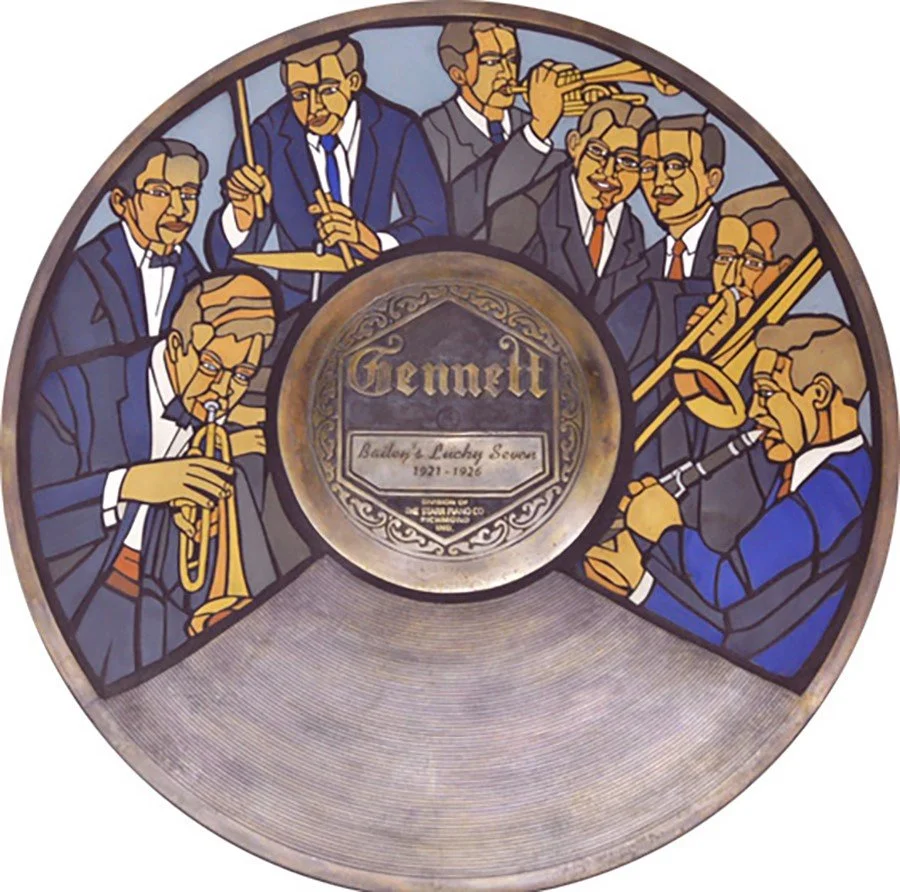Bailey’s Lucky Seven
Bailey’s Lucky Seven
(2011 INDUCTEE) SPECIALIZING IN JAZZ-STYLED DANCE MUSIC, BAILEY’S LUCKY SEVEN MADE OVER 100 RECORDINGS FOR GENNETT BETWEEN 1921 AND 1926. INFUENTIAL BAND MEMBERS INCLUDED RED NICHOLS, PHIL NAPOLEON AND MIFF MOLE.
Medallion Donation: IN HONOR OF STEPHANIE GENNETT BEACH, LOVING SISTER AND BEST FRIEND, BY LINDA GENNETT IRMSCHER.
Gennett Records was home to many pivotal and influential figures in jazz, but if a count of all the Gennett recordings made by those artists were doubled, it still wouldn’t equal the number of sides recorded by Gennett’s most prolific recording group, Bailey’s Lucky Seven. In October 1921, a mere few months after the first-ever jazz release, Victor’s “Livery Stable Blues,” took the world by storm, the Gennett studio in New York City began a series of recordings organized by Sam Lanin to capitalize on the new interest. Lanin, a popular bandleader and music agent, recruited the most in-demand studio musicians for many of the sessions, including Phil Napoleon on cornet, Irving Milfred “Miff” Mole on trombone, Jimmy Lytell on clarinet, Frank Signorelli on piano, and Jack Roth on drums. Lanin often hired Red Nichols to add an invigorating second cornet line to capitalize on the hot sound at the time. Ironically, the group never included anyone named Bailey, and sometimes more or less than seven members recorded together. Additionally, no one named Ladd could be found in the all-white Ladd’s Black Aces, and the five-plus members of the Original Memphis Five all hailed from the Northeast, so the origins of their band names is a bit of a mystery. Recordings reveal an excellent band with well-crafted and smartly arranged tunes that both hit upon the pop dance sound and highlight the various members’ virtuosity and innovative playing. One of the centerpieces of their repertoire was “Nobody Lied,” recorded in June of 1922. This recording featured Phil Napoleon on coronet and Cliff “Ukulele Ike” Edwards on kazoo. Edwards was one of the more in-demand vocalists of both stage and record, who won an Oscar for his recording of “When You Wish Upon a Star” as the voice of Jiminy Cricket in Disney’s “Pinocchio.” Bailey’s Lucky Seven was a group that played with the musical vibrancy akin to that of their fellow Gennett Walk of Fame brethren. Their recordings not only helped keep the lights on at Gennett, but also seamlessly combined the free-spirited, hot sound of jazz with the more danceable pop style of the day to make some of the period’s great records.

